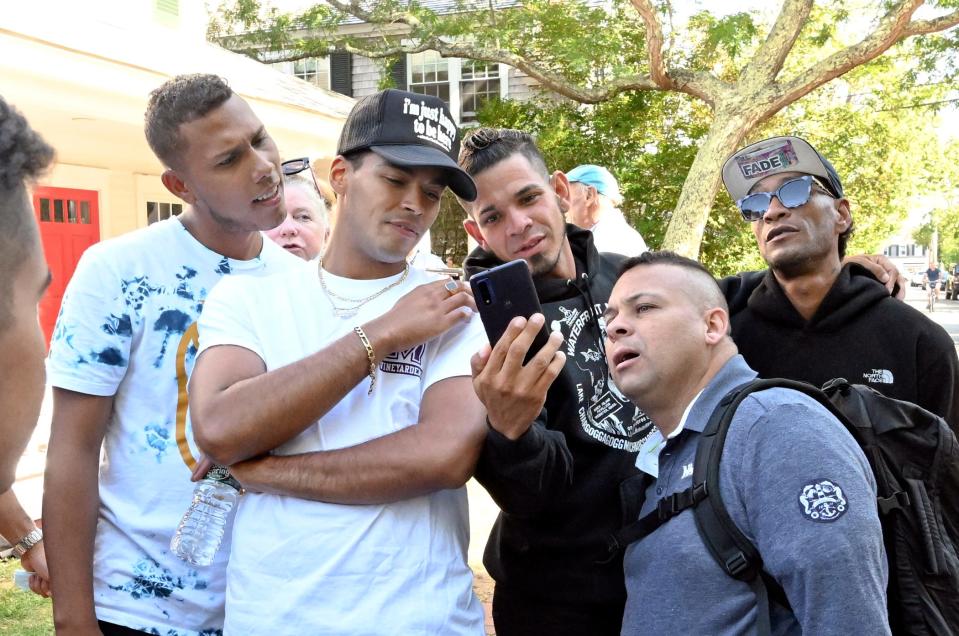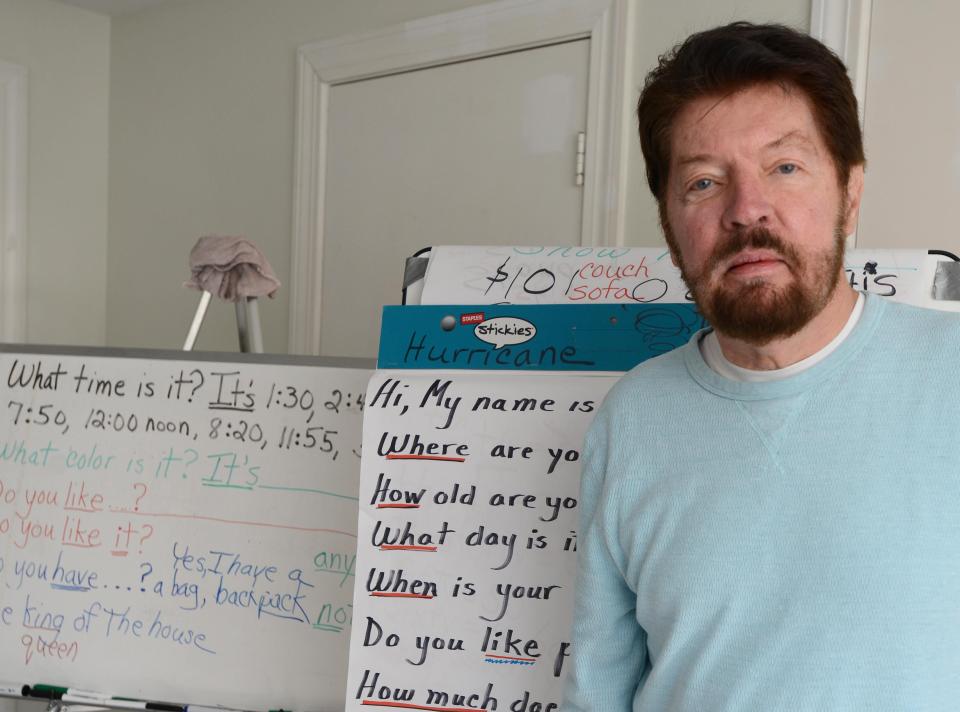Migrants who arrived unexpectedly on Martha's Vineyard now settling in on Cape Cod
When 50 South American migrants arrived at the airport on Martha’s Vineyard Sept. 14, it made national news. No one there knew they were coming and the migrants didn’t know where they had landed.
Everyone quickly learned that Republican Florida Gov. Ron DeSantis had paid to recruit and send them to the Vineyard from Texas with false promises of housing and jobs.
This small group was part of an ongoing migration of some one million Venezuelans fleeing political, economic and humanitarian crises and crossing the U.S. border so far this year, according to news reports.
Vineyarders immediately came to their rescue, providing food and clothing, putting them up in a local church and setting up bank accounts for them. After two days, the migrants were brought to Joint Base Cape Cod on the Upper Cape where they received help from state agencies as local organizations, churches and residents rallied to raise money, collect clothes and provide other needs for them.
When the time came to find more stable housing for the migrants, the Housing Assistance Corp. of Cape Cod and local residents helped 15 to 20 people get into temporary homes across the Cape and the Vineyard. The migrants are pursuing permanent visas or asylum through the federal government.
A Barnstable resident answered a plea for housing in early October and soon six of the migrants — three couples — came to live with her. Each couple has their own bedroom.
'I found great economic prosperity': Immigrants come to Cape for opportunity, better life
The resident and the migrants asked the Times, who knows their identities, to withhold their names to protect their privacy and safety. The migrants declined to be interviewed because they haven’t received the legal documents they need to stay in the country.
The woman hosting the migrants described how the temporary housing is working and how the migrants are adapting to their new environment far from home.
“Things are going fine, a few surprises, but that’s to be expected,” she said, adding, “They don’t like my cooking. It’s too spicy for them.”
She had assumed coming from a Latino country, they liked spicy food. But she and her house guests have worked out the meals, with most doing their own thing for breakfast and lunch and the migrants providing dinner for everyone, inviting their host to eat with them.
Forensic genealogy:DNA databases may help solve Cape Cod cold cases. What to know about privacy vs safety.
Although the host is being generous in providing the housing and some food and amenities, she also has helped them get other aid, such as signing up for transitional assistance that allows them to get food each week from the Family Pantry of Cape Cod in Harwich.
Before coming to the Cape, the migrants received cellphones and debit cards from a generous donor on Martha’s Vineyard. Cape Cod residents provided bicycles, which allow the migrants to get around on their own. They go to the Cape Cod Mall and to the bank and send money through Western Union to their families in Venezuela, the resident host said.
The Hyannis Youth and Community Center is providing memberships that will allow them use of the recreational facilities there, she said.

The host said she expects her guests will stay about six months when they hope to get either visas to stay in the United States indefinitely or be approved for asylum. They are pursuing both avenues and are optimistic, she said.
The migrants are also getting help from lawyers at the Cape and Islands Immigration Resource Center. Two of the men recently also met with lawyers in Boston. If and when they get the needed papers, the Housing Assistance Corp. will help them find affordable housing, Alissa Magnotta, executive director of HAC, said.
Most of those who stayed on the Cape or in Massachusetts had no family elsewhere in the U.S., but they can move on at any time, she said.
Cape commerce:Eight Cape businesses SCORE in 'Pitch-to-Grow' contest
The Unitarian Church of Barnstable has been involved in helping the migrants with donations and English classes. Members were asked for donations of backpacks and winter coats.
The Rev. Dr. Kristen Harper, minister of the church, said several of the migrants have attended Sunday services. The church’s support for the migrants, she said, is “part of our work of faith, our belief in the inherent dignity of all. It is up to us to help others help themselves."
The church had an event on its lawn where money collected from members was donated to the Community Action Committee Immigration Resource Center, Harper said.
A few of the migrants have received permission to work, Harper said. The jobs are either in construction or landscaping, she said.
English language classes taught by Cape volunteer
Bill Tarnowski, a church member and former Spanish and English as a second language teacher, is teaching English to migrants in a space provided by the church. Tarnowski most recently taught immigrants for four years in Vero Beach, Florida.

This stint is a little more challenging, Tarnowski said, because none of the Venezuelan migrants knew any English. He had nine migrants initially, six from the Barnstable home and three others living in another town. Four of them left, however, leaving a small class in a non-classroom setting. The class meets two days a week for two hours at a time.
The class is beginner level, Tarnowski said, and he has to use Spanish often to explain what he is trying to teach them in English, which is not the optimum way to teach a new language. He lacks instructional materials that he wished he had saved from his previous teaching assignments.
“There are some hurdles to get over,” he said, such as the fact that English is not a phonetic language like Spanish. He targets the vocabulary on basics such as colors, numbers, greetings and days of the week. He uses some props from the church’s religious education program as well.
Mistaken migrants:National Guard Lt. Col Hoffman faces third OUI, other charges in tour bus chase case
Tarnowski said he thinks the migrants like it here. He does admire their tenacity in coming to the U.S.
“They got here through sheer determination,” he said. “They walked most of the way.”
They told him the worst part of the journey was in Mexico, where they feared most for their safety.
Cape housing for Venezuelan migrants temporary
HAC has done for the migrants what it does for all people: help them find and connect with other forms of assistance, Magnotta said in a phone interview.
She expressed gratitude to the host families who opened their homes.
“It was a perfect example of how the community rallied to stabilize and hit pause” for the migrants during this transition period, she said. “We take care of each other. That’s what I like about Cape Cod.”
A place to live:Housing to Protect Cape Cod launches its vision. How it hopes to solve the housing crisis
However, Magnotta stressed that the Cape housing is only temporary and not a sustainable situation to maintain a program for any future influx of migrants, which she expects.
She is working with the seven other regional housing agencies in the state that will start advocating with the new governor and administration for a more sustainable program and a way “we can set ourselves up for success.” They didn’t have that opportunity when the migrants arrived unexpectedly, she said.
The migrants arrived at a time when a lot of people on the Cape are hurting financially and the homeless numbers have skyrocketed, Magnotta said. She explained why her organization is being cautious about housing for the migrants.
“It is not replicable," she said. "It takes a lot of resources.”
Get the Cape Cod news that matters delivered to your inbox. Sign up for our free newsletters.
This article originally appeared on Cape Cod Times: Cape Cod residents host Venezuelan migrants sent to Martha's Vineyard


